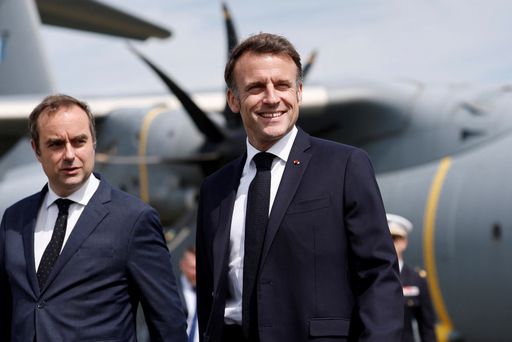French economist Gabriel Zucman, 38, found himself in the crosshairs of France’s richest man, Bernard Arnault, after proposing a wealth tax targeting the ultra-rich as France looks for ways to reduce rising debt and budget deficit.
Zucman, a respected academic known for rekindling interest in the wealth that rich people hide in offshore havens, has suggested a minimum two percent tax on the fortunes of the wealthiest households.
The tax proposal, which would target wealth above 100 million euros ($117 million), has gained political traction in France, where Prime Minister Sebastien Lecornu faces pressure from the Socialist Party to include it in the 2026 budget or face a confidence vote that could topple his government.
Arnault, the boss of luxury goods group LVMH, owns brands like Dior, TAG Heuer and CELINE, attacked the proposal on Sunday, calling Zucman a far-left ideologue.
He accused Zucman of using "pseudo-academic competence" to promote an ideology aimed at dismantling the liberal economic system, which Arnault described as "the only one that works for the good of all".
A day later, Zucman shot back: “We can have fundamental disagreements, and Arnault is entitled, like all citizens, to his opinions. But this debate must take place with respect for the truth and the facts.”
The boy who took on the mighty
Zucman was born in Paris in 1986 and earned his PhD in Economics from the Paris School of Economics in 2013 under economist Thomas Piketty, and has held faculty positions at the London School of Economics, University of California, Berkeley, and more recently the Paris School of Economics.
He is the founding director of the EU Tax Observatory, and in 2023 he was awarded the John Bates Clark Medal, among other prizes, in recognition of his contributions to the study of wealth, inequality, and taxation.
Zucman’s research has repeatedly exposed how large amounts of wealth and corporate profits are shifted into tax havens, evading taxation.
In his 2015 book The Hidden Wealth of Nations, he estimates that about 8 percent of the world’s household financial wealth is held in offshore havens, including jurisdictions like Switzerland, Luxembourg or the Cayman Islands and that profit‑shifting by multinational firms often relocates a substantial share of their profits to low‑tax or no‑tax jurisdictions.
In The Triumph of Injustice, written with Emmanuel Saez, he has further analysed how existing tax systems (in the US, but with broader implications) allow the ultra‑rich to pay lower effective tax rates than the middle class, and proposed policy tools such as progressive wealth taxation and global minimums to curb tax avoidance.

His proposal
The proposal, which could raise around 20 billion euros ($27 billion) annually from just 1,800 households, has been enthusiastically taken up by the French left, including the Socialist Party, whose support new Prime Minister Sebastien Lecornu could need to ensure the survival of his government.
However, it has also sparked fierce backlash from the political right and business elites, who fear that such a scheme would drive the wealthy to flee France.
Chief among the critics is luxury goods tycoon Arnault, 76, whose family fortune is estimated at $157 billion by Forbes.
Zucman rejects being an activist, saying on X that he has never been part of any political movement or party.
“Mr Arnault is wrong to question my professional qualifications by referring to me as having 'pseudo-academic competence,’” Zucman said, adding that such remarks echo attacks on academic freedom seen in the US.
"With the rise of Trumpism, I have seen this rhetoric flourish, denigrating knowledge and research in the United States," he warned.
Zucman also received support from prominent left-wing voices.

Socialist leader Olivier Faure wrote on X: "What destroys our economy and even more, so our society is the absence of any form of patriotism on the part of the ultra-rich who beg for help from the state but refuse to submit to any form of solidarity."
Greens leader Marine Tondelier commented: "We're close to the goal and he's getting nervous," noting the “big conflict of interest” Arnault has in opposing such a tax.
Economist Thomas Piketty, a best-selling author and seen as Zucman’s mentor, also came to his defence, accusing Arnault of "talking nonsense" and dismissing claims that the tax would "bring the French economy to its knees."




















